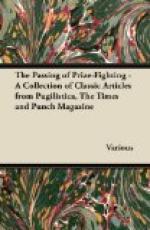Tantalus’ gold is all such Lamias
hold; ’tis Devil’s dice such Mammon
vassals throw;
A sordid fever fires each fool-believer
in the gross glitter, the unholy
glow.
Vile is your Dagon! Circe’s
venomed flagon embruted less than doth the
Lamia’s
wine,
Than Comus’ cup more perilous to
sup—
As
snakes are worse than swine.
The poet’s snake enchanted, who
so flaunted her borrowed robes amidst the
daffodils,
Hath piteous touches. She, from Fate’s
clutches, free some brief space,
“escaped
from so sore ills,”
Moves our compassion. But this modern
fashion of Snake Enchanter looks
unlovely all.
Greed’s inspiration its sole fascination.
Low
selfishness its thrall.
“A Serpent!” So the Sophist
murmured low, and “LYCIUS’ arms were empty
of
delight,”
LAMIA had fled! Would that some sage
cool head, some modern APOLLONIUS,
with the might
Of sense magnanimous, would banish thus
the bestial Lamia of our later day,
Whose fascination draws a noble nation
To
sordid slow decay!
* * * * *
DANTE NOT “IN IT"!—The Italian language is to be excluded from the Indian Civil Service Examination. “The story is extant, and written in very choice Italian,” said Hamlet, and SHAKSPEARE knew that the reference would be intelligible to his audience. But Hamlet “up to date” in this “so-called nineteenth century” would be compelled to give the speech thus, “The original story, I believe, is written in the Italian language, with which none of us here are acquainted.” But, after all, the candidates may be inclined to adapt the Gilbert-Sullivan words and music to the occasion, and sing—
“So, in spite of all temptation,
At the next examination
They’ll bar I-tal-i-an!”
Though, years hence, it may happen that they’ll be sorry they weren’t compelled to get up Italian as one of the subjects.
* * * * *
“O WOMAN, IN OUR HOUR OF EASE!”—which line would make a suitable motto for our very useful, chatty, and interesting weekly contemporary entitled Woman. A propos of “headings,” the only one in the above-mentioned publication to which objection can possibly be taken “on the face of it” is “Wrinkles.” Wouldn’t “Whispers” be better? It is quite enough for Woman to appear with lines, but it’s too bad that wrinkles should be added while she is yet so young.
* * * * *
“CHARLES OUR FRIEND.”—Once again occurs an illustration of the applicability of Dickensian characters to modern instances. In last Thursday’s Times, by special Razzle-Dalziel wire, we read of the return of another great Arctic explorer, Mr. WASHBURTON PIKE, after having braved dangers demanding the most dauntless courage. Here, then, are two single gentlemen rolled into one: it is Pike and Pluck combined.




